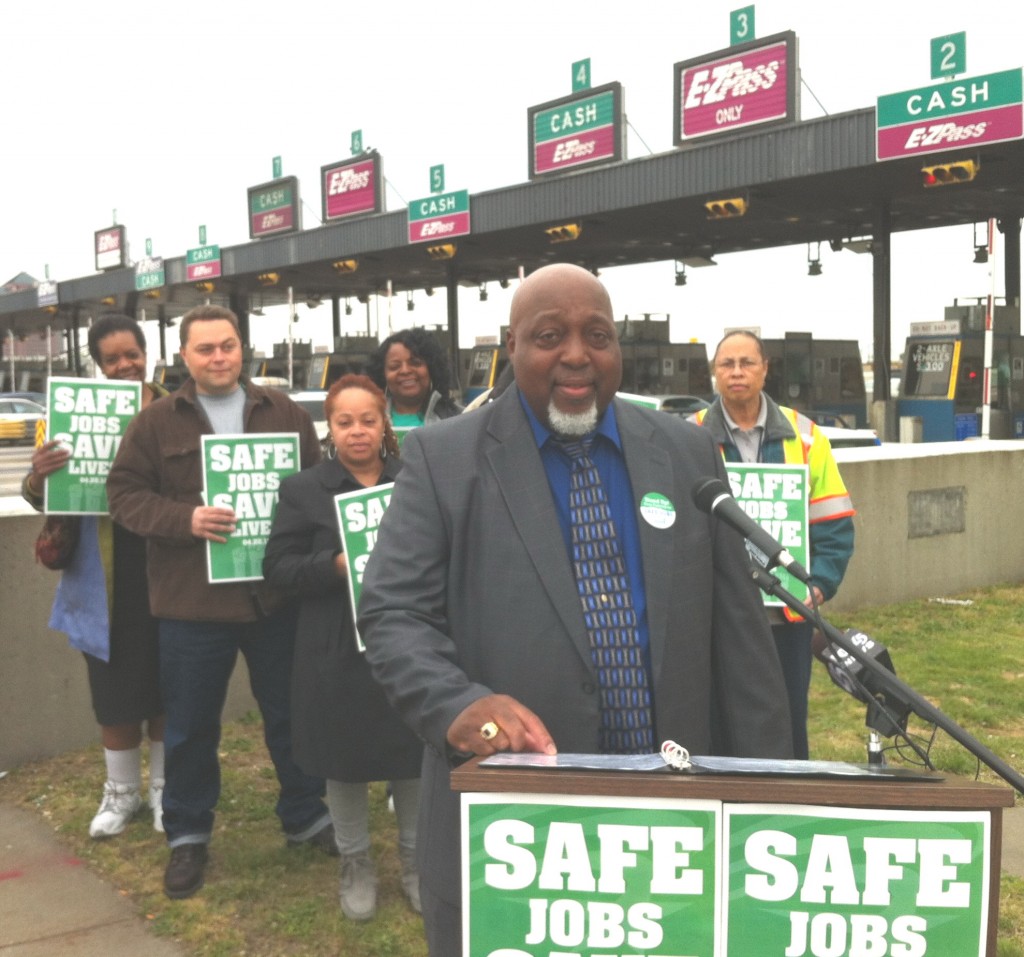Toll agency workers begin effort to unionize
By Len Lazarick
[email protected]

At bay bridge toll plaza, William Randall announces campaign to unionize Maryland Transportation Authority.
Employees of the Maryland Transportation Authority, which operates the state’s toll bridges and tunnels, have kicked off a campaign for union representation even though the governor has yet to sign the bill authorizing collective bargaining at their agency.
A union press release announcing the campaign said they expect Gov. Martin O’Malley to sign the bill May 22.
The administration did not oppose the legislation, HB537 and SB783, which affects employees at four agencies not under the direct control of the governor: MdTA, the Maryland State Retirement and Pension System, the Maryland State Department of Education and the Office of the Comptroller.
These agencies are among the few state departments not currently covered by collective bargaining. The MdTA workers are seeking to be represented by the American Federation of State County and Municipal Employees.
Petitions needed for election
CORRECTION: The agency must hold an election on union representation if 30% of the employees petition to have one. Another union could compete to represent them if 10% of the employees petition for a second choice. Employees also would have the option of choosing no union at all. (Amendments proposed by the Department of Budget and Management allowed the State Labor Board to choose which existing bargaining unit the employees would belong to if they chose to unionize.)
The four agencies have about 4,500 employees, though some would be exempt from unionization. MdTA has 1,790 employees; the Department of Education, 1,400; the comptroller, 1,140; and state retirement agency, 202;
If MdTA employees vote to be represented by a union, not all would be forced to join but everyone would be required to pay “a service fee” for representation on labor issues. For state employees who do not pay dues but are represented by a union, that “Fair Share” service fee is $281 a year, according to the legislative staff analysis.
Service fees would generate millions
In the case of MdTA, those fees could generate more than $4 million a year for AFSCME.
The House version of the bill was sponsored House Speaker-Pro tem Adrienne Jones of Baltimore County. Only AFSCME members and staff testified for the bill.
In a Feb. 21 hearing by the House Appropriations Committee, under questioning by Republican members, AFSCME deputy director Sue Esty said all state employees are covered by the pay and benefits negotiated by AFSCME. Collective bargaining at the four agencies in the bill “brings their involvement to a new level.”
Comptroller’s staff complains
Ida Bailey Jones of the Comptroller’s Office told the committee, “We know that it would be beneficial to everyone. We should have a voice.”
Four staff members from the comptroller’s office, who had voluntarily joined AFSCME, complained at the hearing about lack of training at the tax collecting agency and the lack of responsive management.
CORRECTION: “New employees are not being properly trained,” said Telina Selena Jones, a revenue specialist who has worked for the agency for 16 years. “We spend so much time correcting errors made by other employees.”
Other agency employees also complained about the lack of adequate training.
But committee members wondered how collective bargaining would improve their situation. The workers said it might make managers take them more seriously.
Both versions of the bill were passed by the House and Senate. There was virtually no debate in the House, which passed the bill 91-43. It passed the Senate 36-10. In both houses, almost all Republicans voted against the bill.
In its fiscal and policy note on the bills, the Department of Legislative Services said that, if unionized, the four agencies “may experience a loss of personnel management flexibility to the extent that their employees elect to participate in collective bargaining and the resulting agreements restrict their freedom to adjust staff assignments as needed. This may negatively affect the quality or timing of services they provide to constituent groups.”
UPDATE: Esty disagreed. “That’s clearly not the case. Management maintains many of their rights, including staff assignments,” she said.
Unionization, she insisted, can improve the timing and provision of services to the public by allowing employees to suggest improvements.

MarylandReporter.com is a daily news website produced by journalists committed to making state government as open, transparent, accountable and responsive as possible – in deed, not just in promise. We believe the people who pay for this government are entitled to have their money spent in an efficient and effective way, and that they are entitled to keep as much of their hard-earned dollars as they possibly can.
